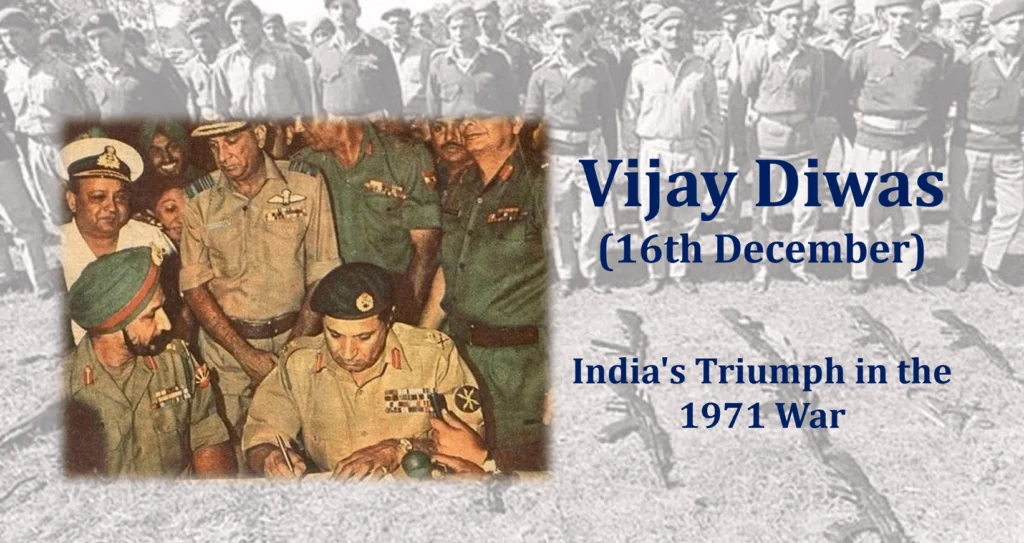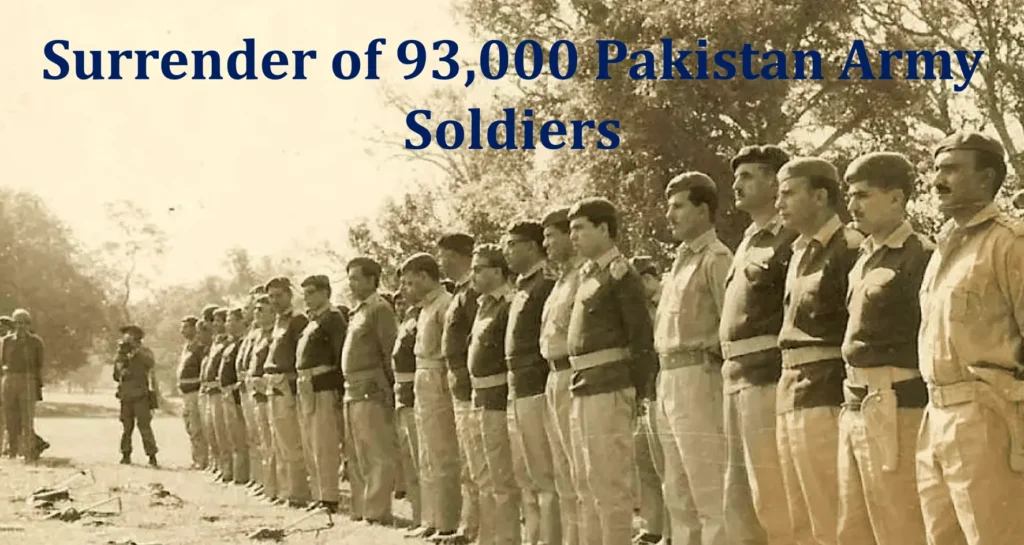
Introduction
Vijay Diwas, which is observed annually on December 16th carries importance in the history of India. It is a day that honors the victory of the Indian Armed Forces, against Pakistan, in the Indo Pak war of 1971 resulting in the liberation of Bangladesh. This article delves into the background of the conflict examines Indias role in the war acknowledges the sacrifices made by soldiers and highlights the significance of this momentous event.
Background and significance of Vijay Diwas
Vijay Diwas, which translates to “Victory Day”, in Hindi commemorates the moment when the Pakistani forces capitulated leading to the establishment of a Bangladesh. It stands as a reminder of Indias strength, and the bravery showcased by its soldiers throughout the conflict. This occasion signifies the victory of righteousness, liberty and compassion.
Historical overview of the 1971 Indo-Pak war
The roots of the Indo Pak war, in 1971 can be traced back to the political divisions between East Pakistan (Bangladesh) and West Pakistan. The inhabitants of East Pakistan experienced oppression, economic inequalities and a denial of their Bengali heritage and ambitions by the governing powers, in West Pakistan. The unrest escalated into a full-blown conflict when the Pakistan Army crack downed on political rebels and indulged in horrendous human rights abuses.
Importance of commemorating and understanding Vijay Diwas today
Commemorating Vijay Diwas is a way to remember the challenges endured by the people of Bangladesh and the sacrifices made by soldiers. It is essential to grasp the background and the importance of this triumph in order to honor the values of patriotism, solidarity and unwavering dedication to fairness and liberation.
Prelude to the Conflict
Tensions between East Pakistan and West Pakistan
Beneath the surface of a united Pakistan, tensions between East and West Pakistan simmered due to socio-political differences. East Pakistan felt marginalized, with grievances relating to economic disparities, inequality, and cultural suppression against their Bengali identity. These grievances led to increased unrest.
Genesis of the Bangladesh Liberation War
In response to West Pakistan’s refusal to recognize the electoral mandate of the Awami League, political rebellion and resistance against the oppressive regime emerged in East Pakistan. The Bengali resistance movement aimed to establish an independent Bangladesh. The Pakistan Army reacted with a crackdown leading to numerous violations of human rights, such, as widespread killings and acts of sexual violence.
“The global community became aware of the conflict. Closely monitored the unfolding tragedy actively seeking ways to intervene.”
India’s Role in the 1971 War
Indira Gandhi’s Leadership in the 1971 War
Indira Gandhi‘s leadership during the 1971 War between India and Pakistan stands as a testament to her resolute statesmanship and strategic prowess. As India’s Prime Minister, Gandhi exhibited remarkable diplomatic finesse and political acumen in managing the escalating tensions between East and West Pakistan.
Gandhi ardently supported the aspirations of the Bengali population in East Pakistan for independence and provided crucial backing to the Mukti Bahini, the Bengali freedom fighters. Her diplomatic maneuvers in garnering international support for the cause of Bangladesh while diplomatically isolating Pakistan were instrumental.
When diplomatic efforts reached an impasse, Gandhi displayed boldness by authorizing India’s military intervention to aid the Mukti Bahini. Under her leadership, the Indian armed forces executed well-coordinated military operations that swiftly incapacitated Pakistani forces in East Pakistan.
Gandhi’s leadership culminated in the decisive victory of India and the creation of Bangladesh. Her unwavering commitment to justice and her proactive approach not only liberated Bangladesh but also solidified her legacy as a prominent global leader. Indira Gandhi’s leadership in the 1971 War remains a cornerstone in India’s history, showcasing her as a leader of indomitable strength and vision.
Winning Strategy of Army Chief Sam Manekshaw
Army Chief Sam Manekshaw’s strategic brilliance played a pivotal role in India’s resounding victory in the 1971 War against Pakistan. As the Chief of the Indian Army during the conflict, Manekshaw displayed exceptional leadership, foresight, and tactical acumen.
Manekshaw meticulously planned and executed a multifaceted strategy that ensured the Indian military’s success. His approach involved thorough preparation, timely decision-making, and astute maneuvering of troops. He emphasized the importance of logistics, intelligence, and coordination among different branches of the armed forces.

One of Manekshaw’s crucial strategies was the simultaneous attacks on multiple fronts, including the eastern and western borders of Pakistan. This strategic move prevented Pakistan from concentrating its forces in one area, ultimately leading to the decisive victory in the eastern theater.
Manekshaw’s leadership also emphasized the importance of understanding the local terrain and exploiting it to gain an upper hand in battles. His ability to inspire and motivate troops boosted their morale, contributing significantly to their success on the battlefield.
His prudent leadership and meticulous planning culminated in the historic victory, resulting in the surrender of Pakistani forces in East Pakistan and the creation of Bangladesh. Field Marshal Sam Manekshaw’s strategic brilliance remains a cornerstone in India’s military history, earning him admiration as a master tactician and a legendary military leader.
Indian Armed Forces mobilization and strategies
To support the Bengali resistance in East Pakistan, India’s military, under the Eastern Command, devised comprehensive strategies and objectives. The armed forces aimed to neutralize Pakistan’s military presence and establish conditions for the liberation of Bangladesh.
Capture and Liberation of Bangladesh
Indian military tactics proved highly effective in the 1971 war. The armed forces engaged in major ground battles, skillfully coordinated with the Mukti Bahini (the Bengali resistance) and conducted successful air operations and a naval blockade. These strategic moves resulted in crucial turning points that weakened the Pakistani forces. Eventually, on December 16th, 1971, the Pakistani army under General Amir Abdullah Khan Niazi surrendered unconditionally, leading to the birth of Bangladesh as an independent nation.

“The capture and liberation of Bangladesh highlighted the competence and heroism of the Indian Armed Forces.”
Sacrifices and Heroism
Stories of valor and bravery
The war witnessed numerous acts of valor and bravery from both individual soldiers and commanders. Inspiring tales emerged from the battlefields, such as the heroic actions of Lance Naik Albert Ekka, who sacrificed his life while fighting to defend an important position. These stories highlight the unwavering spirit and dedication of the Indian soldiers.

Commemorating fallen heroes
To honor the fallen soldiers, several memorialization efforts have been made, ensuring that their contributions are never forgotten. National recognition, such as the Param Vir Chakra (India’s highest military honor), has been bestowed upon deserving individuals who displayed exceptional valor during the war. Veterans’ associations also play a vital role in commemorating the martyrs and supporting their families.
“The collective remembrance and gratitude towards our fallen heroes serve as a reminder of the enormous sacrifices they made for our nation.”
Legacy and Impact
Political and diplomatic ramifications
The 1971 war brought forth significant political and diplomatic challenges for India. The conflict reshaped regional power dynamics, firmly establishing India as a dominant force in South Asia. India’s diplomatic gains were reflected in its strengthened international standing and its ability to champion human rights issues on the global stage.
“The 1971 war cemented India’s commitment to upholding human rights and shaped its future stance on humanitarian interventions.”
Bangladesh-India relations post-war
The war also set the groundwork, for relations between Bangladesh and India. Over time these two countries have established connections in terms of trade, culture, security and people, to people exchanges. Addressing unresolved issues and fostering cooperation in various sectors have been key priorities in strengthening these relations. The shared history of the 1971 war continues to serve as a powerful bond between the two countries.
“The legacy of the 1971 war serves as a testament to the enduring friendship and cooperation between Bangladesh and India.”
Summary and FAQs
Recap of the significance of 16th December Vijay Diwas
Vijay Diwas, observed annually on the 16th of December marks Indias achievement, in the war of 1971 and the establishment of Bangladesh as a nation. It serves as a tribute to the principles of fairness, liberty and compassion while paying homage, to the soldiers who sacrificed their lives on both sides.
Importance of remembering and learning from history
Remembering and understanding the significance of the 1971 war and Vijay Diwas allows us to honor the sacrifices made by soldiers and to learn from history. It reinforces our commitment to justice, freedom, and peace while strengthening our bonds with neighboring countries.
“By commemorating Vijay Diwas, we ensure that the legacy of the 1971 war lives on, inspiring generations to come.”
This article offers an overview of Vijay Diwas and the 1971 war shedding light on its context Indias involvement and its impact, on the Subcontinent. It stands as proof of the bravery and selflessness displayed by those who participated, acknowledging a moment that left a lasting impression, on history.
Frequently asked questions (FAQs)
What were the main factors leading to the outbreak of the 1971 war?
The primary causes of the 1971 war stemmed from disagreements between East and West Pakistan now recognized as Bangladesh and Pakistan. Differences, in language, culture and political power created tensions that ultimately escalated into conflict.
How did the international community contribute to this conflict?
During the conflict, various countries and organizations took different sides or positions. Some countries supported Pakistan, while others supported Bangladesh. The international community tried to help by providing aid, diplomatic support, and even sending peacekeeping forces to assist in resolving the situation.
How did Indian military strategies lead to the capture and liberation of Bangladesh?
India had an impact, on the war by providing support to Bangladesh in their struggle for independence. The military tactics employed by India proved effective in aiding the Bangladeshi forces ultimately resulting in the capture and liberation of Bangladesh, from Pakistan.
What contributions did individual soldiers and commanders make during the war?
Individual soldiers and commanders on both sides showed bravery, determination, and leadership during the war. Their efforts in battles, strategic planning, and sacrifices greatly influenced the outcomes of various conflicts within the war.
How did the political and diplomatic landscape change after the 1971 war?
After the war came to an end there were shifts, in the diplomatic dynamics, among the nations involved. Bangladesh emerged as a nation. Pakistan had to face the consequences of the war, and there were shifts in alliances and international perceptions due to the conflict’s outcomes.
